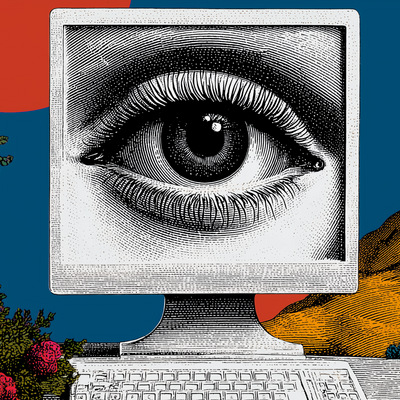
Hey! Dan here. Today, a new book was published by my favorite neurobiologist, Robert Sapolsky. It's called Determined, and it's about why science says we have no free will, and how we might best live once we accept that.
I have a review of it coming for you on Friday, and to whet your appetite, I’m sharing an article I wrote about one of his previous books, Why Zebras Don’t Get Ulcers. It’s one of the most popular articles I’ve ever written—I hope you enjoy it.
How hard should I push myself?
It’s a question I ask myself a lot, and I bet you do, too. On the one hand I really want to push myself. I’m ambitious, and I want to leave it all out on the field. Some of my peak work moments have come when I’ve pushed myself to a place where I didn’t think I could go. We all have more ability to adapt to stress and pressure than we think we do.
On the other hand, I want to be kind to myself. I question how much the drive to push myself is to make up for something that I feel is missing or inadequate—and whether pushing myself will fill the hole. I sometimes wonder whether letting myself off the hook is just laziness masquerading as self-care. It’s hard to tell.
But I also wonder whether pushing myself might, in fact, kill me. Constant pressure creates chronic stress, and there are many scientific studies that show that chronic stress is harmful. It makes you more susceptible to heart disease, it makes it harder to recover from illnesses, and it can affect your sleep and even your working memory.
Then there’s a wealth of literature (and conversations on Twitter/X) that says that stress is actually good for you.
What gives? How much stress is good, and how much is bad?
In order to understand the question I posed at the top—how much we should be pushing ourselves—we have to better understand stress. We need to understand what the stress of pushing ourselves does to our bodies, how much we can take of it, and how we can, hopefully, learn to cope with it better.
That’s what Robert Sapolsky’s book, Why Zebras Don't Get Ulcers, is about. Sapolsky is a stress researcher, and as far as I can tell, he's one of the good ones. He's the kind of intellectual who's smart, but also smart enough to know what he doesn't know. Though he's written a book, he doesn't come across as trying to sell it to you. He's like your zany, self-aware, smart-as-hell uncle who happens to study the stress responses of baboons for a living.
In the book Sapolsky harnesses his own research, as well as a wide array of animal and human studies, to figure out the answer to a fairly simple question: how does stress work, and why do humans get stress-related diseases?
It’s an interesting question—you can understand why a human body might react poorly to, say, not being fed enough. But why does psychological stress have dangerous consequences?
The stress response is designed to get us out of danger. If you're an animal being chased by a lion in the Serengeti, you definitely want to have a stress response. Being stressed means you’re preparing your muscles to move—a lot. Your heart rate rises and pushes blood to your extremities. Glucose is released into your bloodstream to help you pump your muscles as fast as possible.
While the stress response pushes certain parts of your body into high gear, it also turns certain parts of your body off. For example, when you’re stressed, digestion is inhibited. What’s the point of wasting energy on digesting food for later when you might not even survive for 10 more minutes? Reproduction is also inhibited for the same reason.
This is all well and good in the wild—you don't need to reproduce if a lion is eating your face off. But humans, and some more intelligent animals, have evolved the stress response from an unqualified Good Thing into… well, something that might kill you.
What’s different about our stress response? Well, we have the ability to anticipate danger. Other animals can do this, too: it’s a good thing to feel stress upon seeing the lion all the way across the savannah, instead of only when it mauls your intestines. But humans have evolved this anticipatory sense far beyond other animals. We anticipate bad things months, years, or even decades out. And when we do this, the very same stress response gets turned on—even though there is no immediate danger, and there is no immediate way to avoid it.
Suddenly, you aren’t just activating the stress response for a few minutes when you’re running for your life. Instead, it’s activated all the time—chronically. And this is where the problems start.
Remember that the stress response amps some parts of your body into high gear and turns off others? If that occurs chronically, you start to have problems. Suddenly, your digestive system isn’t just inhibited for a few minutes while you’re escaping danger. It’s chronically curbed. The same thing happens with your immune system—chronic stress tamps it down, making it harder for you to fight off diseases. Stress is bad for your heart, too: if you’re pumping blood as if you need to run for your life all the time, you’ll get high blood pressure.
In these cases, according to Sapolsky, “the stress response can become more dangerous than the stressor itself, especially when the stress is purely psychological.”
To be clear, stress doesn’t actually make you sick. But it does leave you more vulnerable to disease and illnesses than you otherwise would be—and those can make you sick.
So is stress bad?
Stress isn’t good or bad. It’s a tool. In small doses it’s good, but too much of a good thing becomes a bad thing pretty quickly.
When your stress response is working properly, you run faster, your memory gets sharper, and you’re able to focus better. But when your stress response is over-activated or chronically activated, you get ulcers and heart disease. It’s bad!
A good analogy is exercise. Too little exercise, and you open yourself up to a whole host of diseases, both physical and psychological. Too much, and you’ll die of exhaustion.
What do we do about it?
The answer to the question from the top, then, is that it’s great to push yourself—but you should be paying attention to the signs that tell you that you need a break. You also need to give yourself plenty of ways to manage stress while you’re going through it, so that it doesn’t affect you as badly as it could.
This is a really interesting nugget from the book: stress isn’t mathematical. Expose the same person to the same stressor, and they will have different stress responses based on their coping strategies. If you want to live a life where you’re pushing yourself, it’s best to develop a variety of coping strategies to help you manage the accompanying stress.
Here’s what Sapolsky recommends:
Increase your sense of control
If you put a human in a room where loud noises are going off, you’ll activate their stress response. If you give the human a button to reduce the volume of the loud noises, they’ll be less stressed—regardless of whether they even use the button.
Just knowing you have the option to reduce stress is enough to make something less stressful—even if you’re not actually controlling the stressors at all.
It’s why the first few sessions of therapy are often so powerful for patients. You’ve finally found a way to manage how you’re feeling, even though you probably haven’t changed too much about your life.
When you’re facing mild to moderate stressors, ask yourself, How can I increase my sense of control in this situation? You might find there are simple answers that will make you feel a lot better.
Increase your sense of predictability
Rats that are exposed to repeated electric shocks are more likely to get ulcers. But if you ring a bell before you administer the shock—making the shock more predictable—the rats are less likely to develop them. If you make the stressor predictable, you only have to get stressed right before it happens. That means you’re not stressed the rest of the time, so the stress response doesn’t wreak as much havoc on your body.
Making the stressors in your life more predictable can have a similar effect. When CEOs keep the same routine every day, that's the benefit of predictability in action.
Of course, we can’t make our lives totally predictable (and, in fact, that wouldn’t be desirable). But the more you can expose yourself to stressors in a predictable way, the better off you’ll be. For example, maybe only check email a couple of times a day.
Create outlets for frustration
When rats that are exposed to repeated stressors are given a piece of wood to gnaw on, they are far less likely to develop ulcers. Outlets for frustration are another important coping mechanism for stress.
There are many unproductive outlets—for example, taking things out on your partner or a co-worker. But there are also many productive ones, like exercise or journaling. Making a list of outlets and returning to them again and again can reduce the havoc that chronic stress can wreak on your body.
Increase social support
Social support is the last coping strategy on the list, and it’s perhaps my favorite one.
If you give a primate a stressor in the lab, you’ll find elevated markers of stress in its blood and manifested in its behavior. But give the primate a stressor when it’s surrounded by friends, and its stress markers will be lower, even for the same level of stressor.
The same thing happens in humans. For example, in one study, parents of children who have been killed in war were no more likely to get disease or die—except if they were already widowed or divorced.
Creating a vibrant sense of social support can put an unmanageable stressor into perspective and help keep it under control. Without social support, even small things can set us off in ways that are unproductive and unhealthy.
The Only Subscription
You Need to
Stay at the
Edge of AI
The essential toolkit for those shaping the future
"This might be the best value you
can get from an AI subscription."
- Jay S.
Join 100,000+ leaders, builders, and innovators

Email address
Already have an account? Sign in
What is included in a subscription?
Daily insights from AI pioneers + early access to powerful AI tools










Comments
Don't have an account? Sign up!
Excellent review. Thanks!!
Stress is similar to caffeine. When used judiciously, it can enhance your productivity. However, when abused, it can take a severe toll on you.